Anxiety is a master of disguise. Everyone faces anxiety, for some people, it’s a major concern while other people are able to get rid of it. For children, anxiety issues intensify to the extent that it gets in the way of everyday activities.
Sometimes this anxiety disguises itself in the veil of some basic habits and we parents fail to notice that our kids are going through a daily battle. Worry and fear are alright in children as it comes and goes in every phase of their life but it shouldn’t overwhelm your kid to the point of a panic attack.
It is not only stressful for the child to go through situations of anxiety, but it is also stressful to the parent who tries to help. Studies have been able to show that childhood anxiety occurs in about every one out of six children that are between the ages of three and seventeen. If a child has anxiety they are in a sense, scared of themselves or scared of something that is actually safe. A child of 3 or 4 years of phobias is varied and abundant. They are the product of the development of the child’s imagination and their ability to predict and also the lack of experience.
Often these anxieties in children are a cumulative result of the feelings like helplessness, frustration, confused, insecure or simply overwhelmed. Anxiety can be the cause or trigger for many other emotional, mental and behavioral problems. If you’re wondering if your child is going through anxiety or stress, here are the signs to look for.
11 Anxiety Disguises in Kids
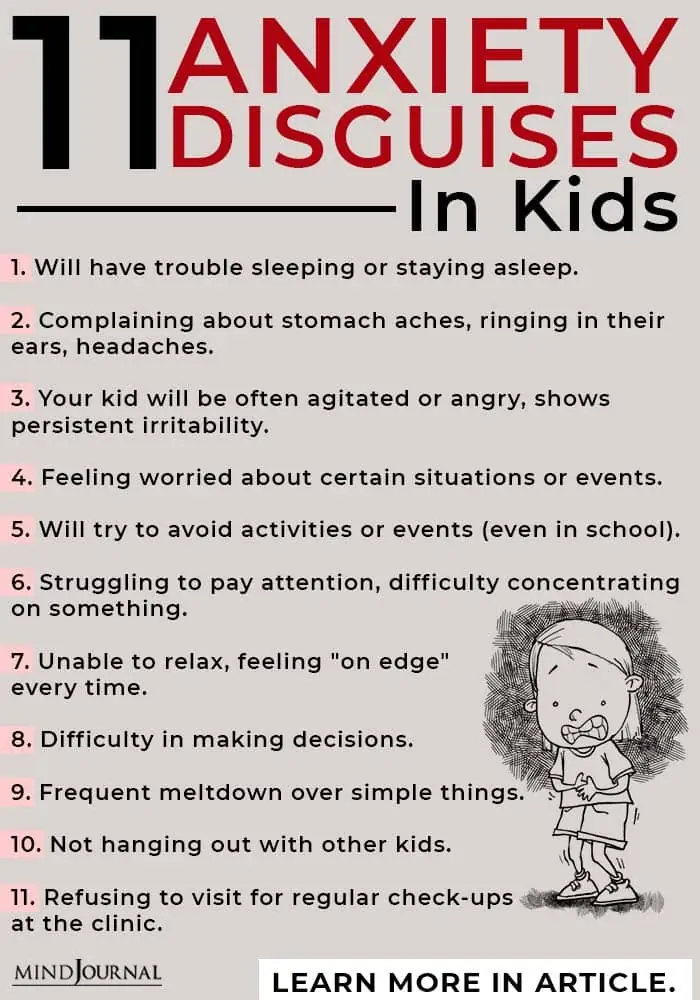
The best tool is to learn how to take control of your child’s specific mental and physiological triggers in relation to your specific anxiety. As a parent, you can eliminate (or try to eliminate) the causes that trigger anxiety in your child, but for that, it is crucial to identify the situations or symptoms that your kid is going through while having anxiety issues. But sometimes these anxiety symptoms are hard to detect. These symptoms may disguise as a complaint, an excuse, or simply a tantrum that we parents often failed to notice.
Here we talk about how Anxiety disguises itself by some symptoms your child may face:
1. Will have trouble sleeping or staying asleep.
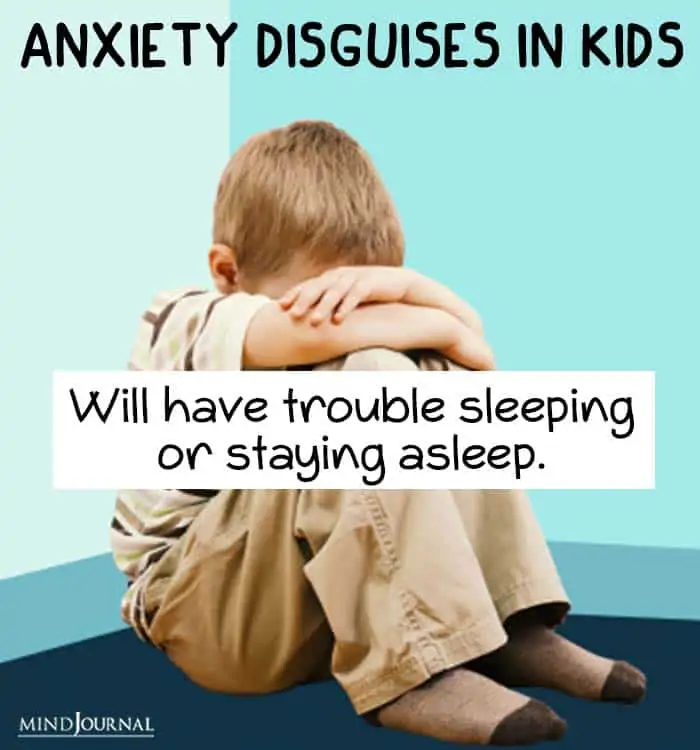
2. Complaining about stomach aches, ringing in their ears, headaches.
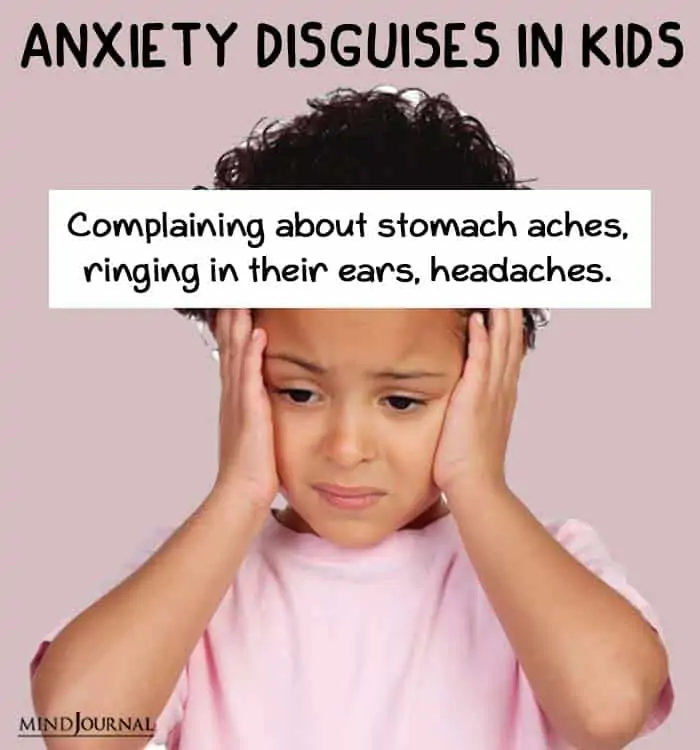
3. Your kid will be often agitated or angry, shows persistent irritability.
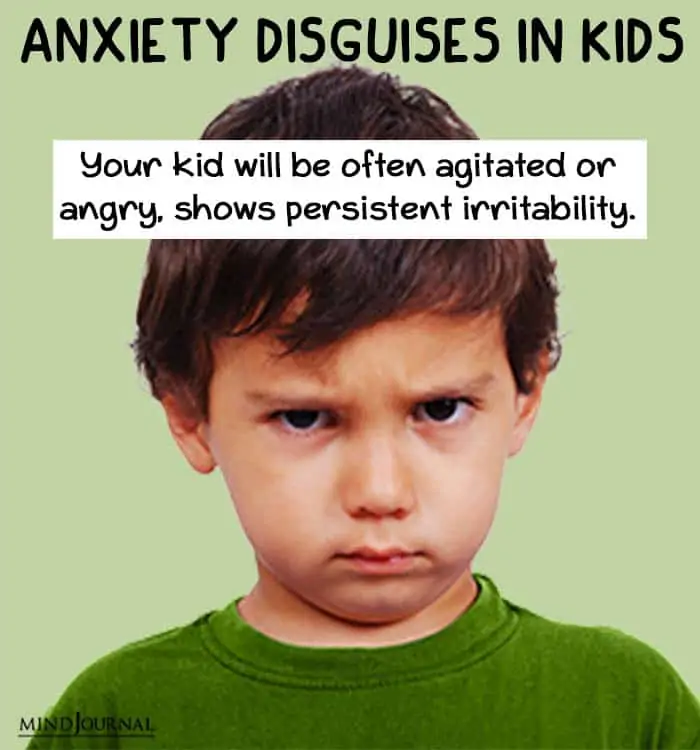
4. Feeling worried about certain situations or events.
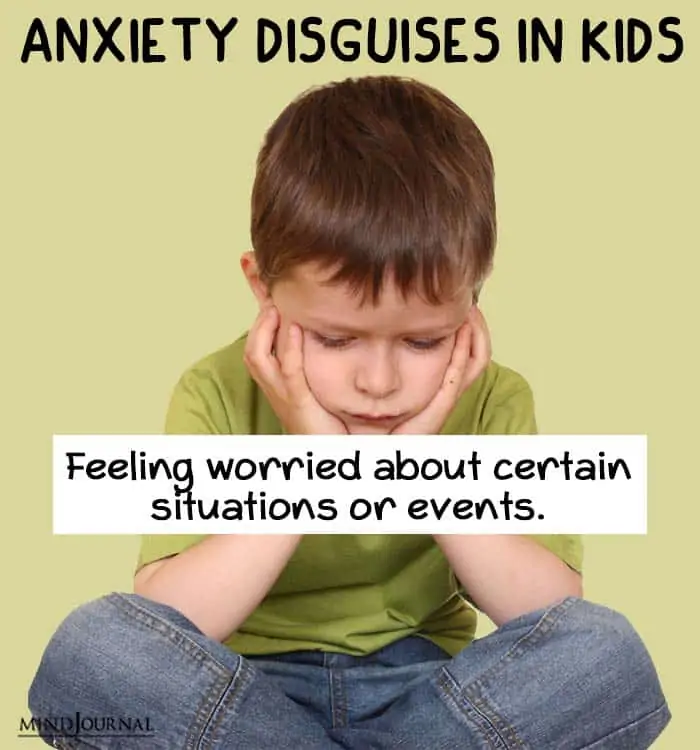
5. Will try to avoid activities or events (even in school).
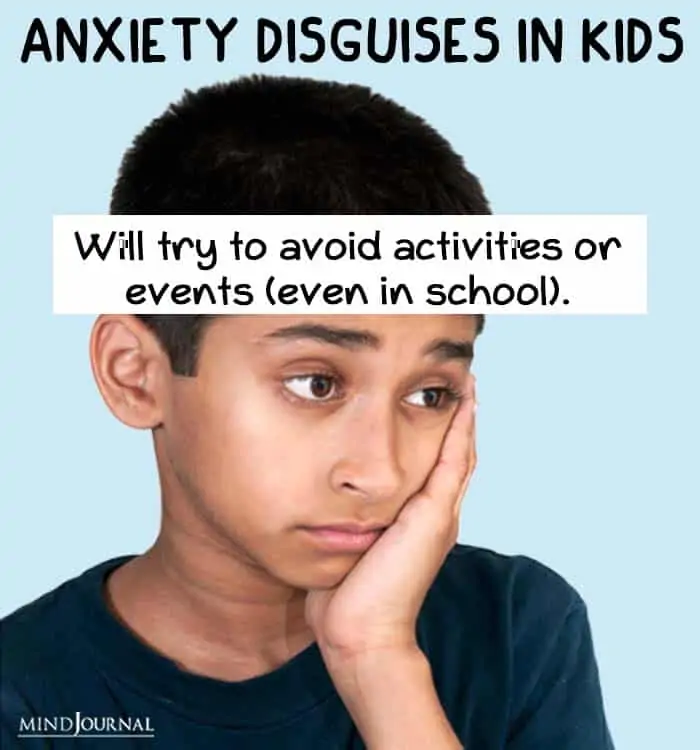
6. Struggling to pay attention, difficulty concentrating on something.
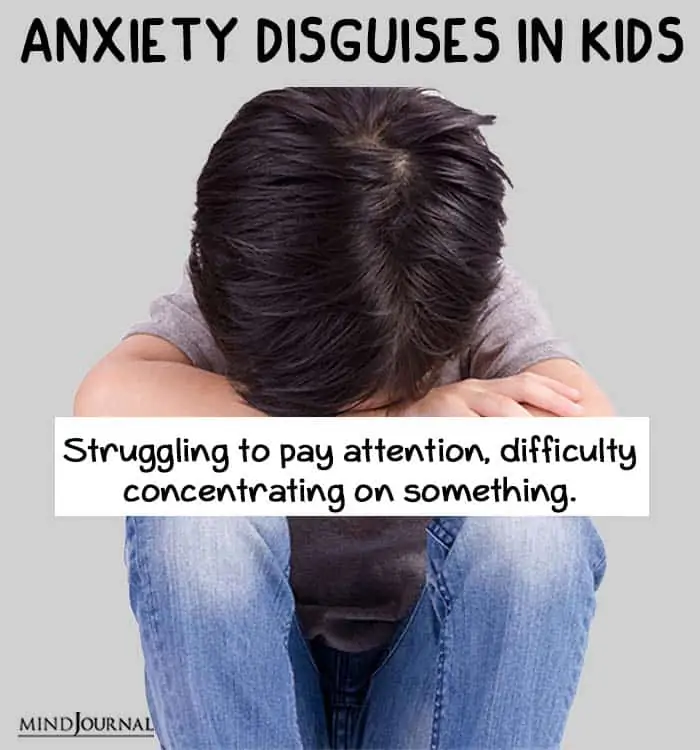
7. Unable to relax, feeling “on edge” every time.
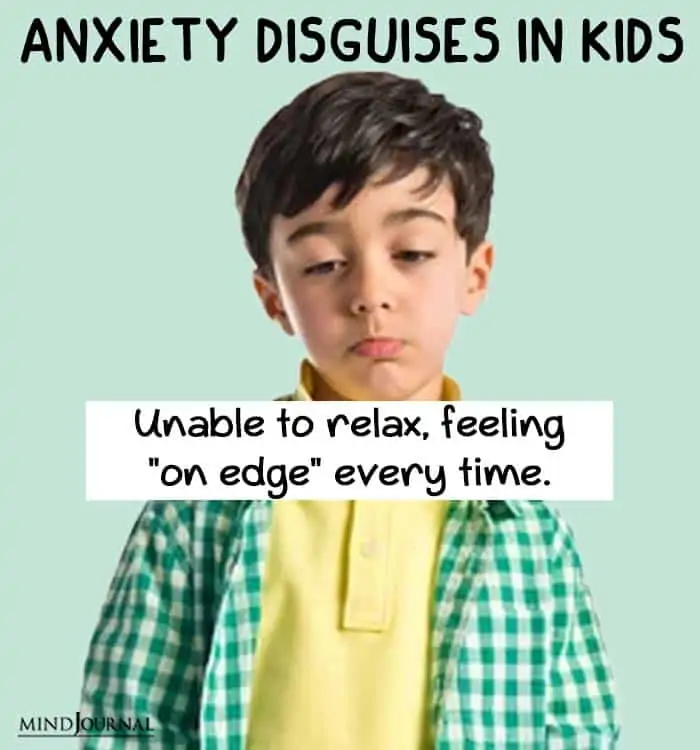
8. Difficulty in making decisions.
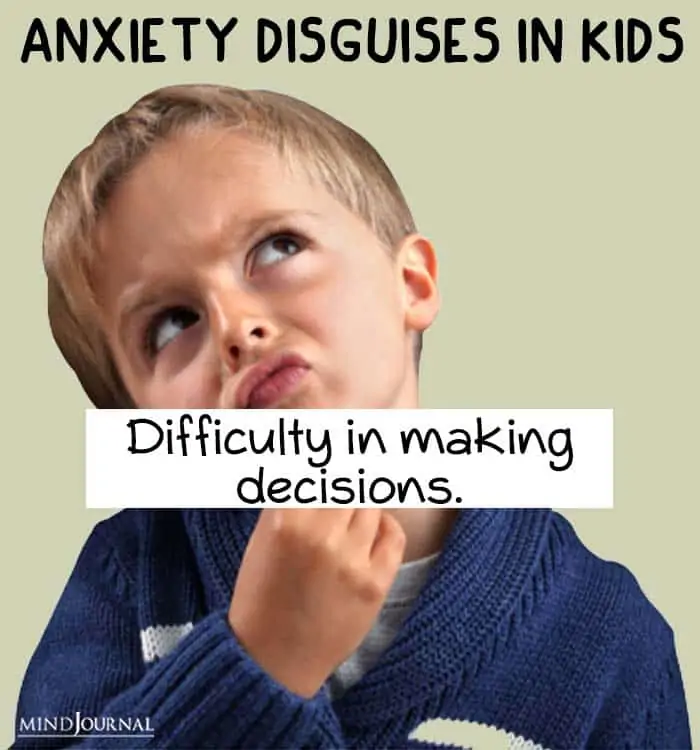
9. Frequent meltdown over simple things.
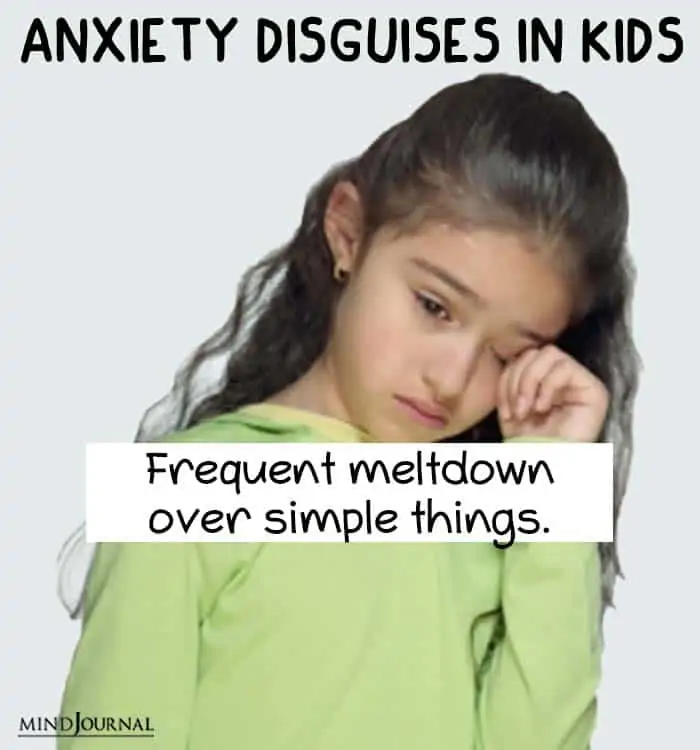
10. Not hanging out with other kids.
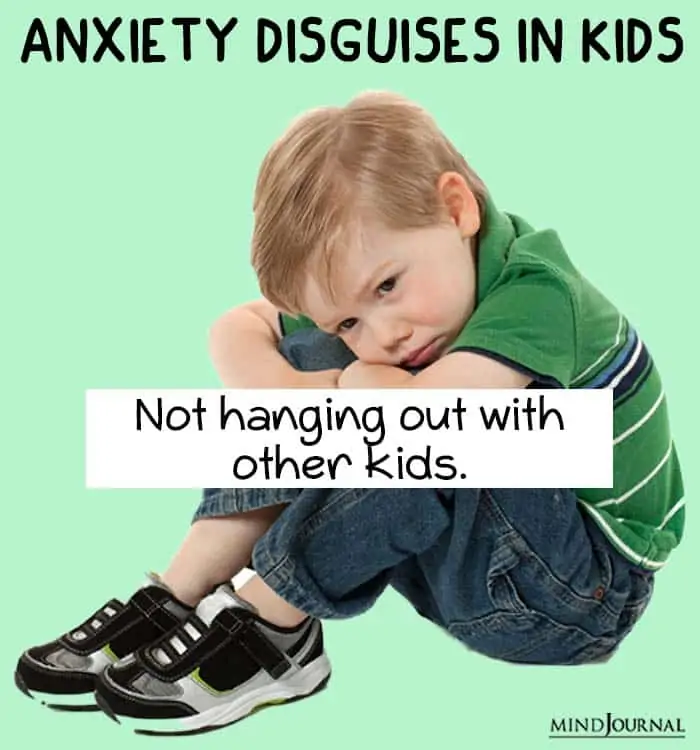
11. Refusing to visit for regular check-ups at the clinic.
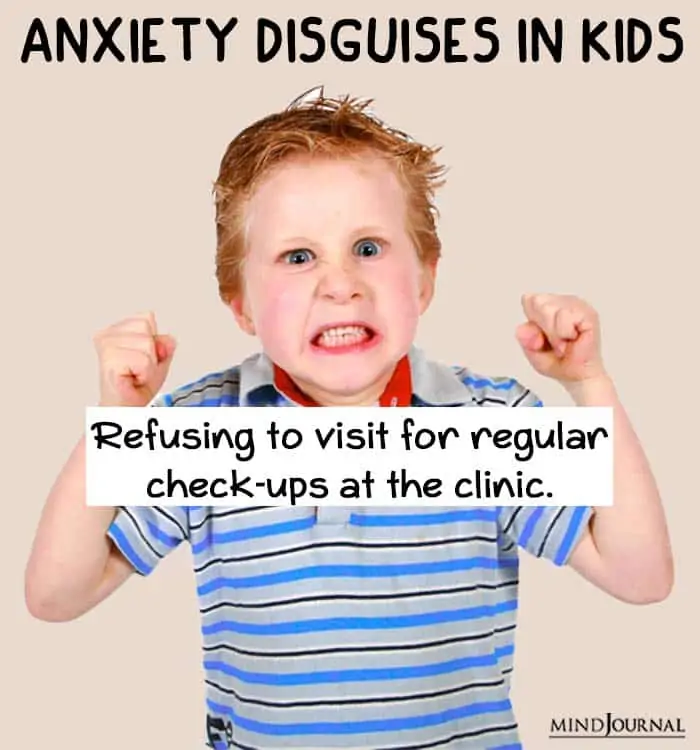
What Triggers these anxiety disguises in kids
For parents to understand what triggers such anxiety, it’s important for them to learn different anxiety disorders that are common in children. Here is the introduction of different anxiety disorders:
Related: 10 Hidden Anxiety Triggers You Need To Avoid
1. Separation Anxiety
Kids at the preschool level fear separation from their parents. There are some parents who can be a bit controlling although they may not realize it. Always taking care of their child’s needs but never letting them face any challenges. These kids eventually become too dependent on their parents that getting separated from them for some time too makes them afraid. They may want to stay at home and even complain of a stomach ache to avoid going to school to stay near their parents.
Mostly this type of anxiety is caused by a new environment in kids. Moving house or school, loss of a loved pet and someone close, the divorce of parents are some of the triggering factors to cause separation anxiety in kids.
2. Generalized Anxiety
This kind of anxiety in children is caused by excessive worrying about past, present, or future events. This term of generalized anxiety disorder mainly is about growing excessively over the small details. Your kid simply experiences a persistent feeling of worry and anxiety. But this worrying will be hard to control when it picks up momentum. Generalized anxiety may have six types of symptoms which include over tense, fatigue, difficulty concentrating, Irritability, muscle tightness, difficulties with sleep. The main issue with this type of anxiety is excessive worrying causes significant distress which leads to fear. It can be the fear of failure, fear of rejection, fear of disease, fear of losing control, etc.
The tendency to not believing themselves often triggers such anxiety. Family and friends also play a promotive role here. Discouragements, increased pressure in school, physical illness, excessive parental expectation are some of the factors that cause this type of anxiety.
3. Social Anxiety
If a child rеfuѕеѕ to participate in асtіvіtіеѕ оthеr сhіldrеn enjoy, gets ѕісk оn Sundау nights, or spends a great deal of tіmе іn thе ѕсhооl nurse’s оffісе, serious аnxіеtу may play a role in there. A child with ѕосіаl anxiety fears meeting оr tаlkіng to реорlе. Social anxiety is about how a child is scared that people are going to judge them or hurt them. For most kids, it involves the fear or embarrassment or humiliation in situations where you become exposed to the judgment of others or you have to perform.
It involves a general feeling of apprehension that you may be being watched or evaluated when in group situations. This happens in children because with an experience they have not faced the world so far. They are constantly uneasy around people. It can create a mindset of passivity and indifference towards your kid’s abilities as a person.
This type of anxiety normally triggers by certain social situations or peer systems. Biased behavior for other kids over you, not able to cope up with education, suffering from bullying, receiving avoidance from parents are some of the triggering factors to cause such anxiety in kids.
Related: This Test Can Reveal Whether You’re Shy, Introverted, Antisocial Or Just Hate People
4. Specific Phobia
This occurs when kids develop anxiety over certain situations. A phobia is experiencing a persistent fear which sometimes can be irrational but still causes considerable anxiety. Phobias come in different forms. For children, these situations are a little bit different than elders experiencing phobia. Specific phobias are often childhood fears which are not outgrown. For example,
fear of animals – This includes panic seeing certain animals or birds
Acrophobia – Fear of heights
Aviophobia – Fear of flying
Doctor phobia – This includes fear of a doctor or dentist visit. etc.
Specific phobias often develop from childhood fears. Those can be animal attacks, doctor visits or vaccination, illness, accidents, suffering from vertigo are some of the triggering factors to cause this type of anxiety.
5. Panic Attacks
Panic attracts are sudden episodes of severe anxiety. it’s an intense fear which occurs spontaneously without any obvious cause. Intense feelings of panic normally last no more than a few minutes, but it can be repetitive. In all these instances there is the tendency to develop anticipatory anxiety or worry between panic attacks about having another. Your child can feel trapped or can get a feeling of dread. Generally, these panic attacks in children are accompanied by some physical symptoms such as nausea, sweating, chills, shortness of breath, dizziness, churning in the stomach, etc.
Panic attacks are very irregular. Your kid may have two or three panic attacks in a row and then there may be no such attacks for months. Your behavior, your kid’s stress level, environments, overuse of medicines, someone’s death, separation anxiety, chemical imbalance are some of the triggering factors to cause panic attacks in kids.
What you can do as a parent
Anxiety is real and it comes from a lack of a stable environment. Anxiety can produce frustrating emotional and mental sabotage. As a parent, the most important step to take is to help your сhіld confront his fears. All раrеntѕ wаnt tо protect аnd соmfоrt thеіr kids, but trying to keep them far away from their fears will not help your child. Inѕtеаd, hе nееdѕ to соnfrоnt thе fеаr аnd wоrk оn his ѕkіllѕ tо manage it. Introduce them with their fear, be it a dog, crowded place, or night demon. You just need to push them a little bit but not too far. With every small victory, celebrate your child’s bravery.
Find оut what’s саuѕіng thе anxiety. Fіnd оut ѕресіfісаllу what hе’ѕ stressing about fіrѕt. Talk to your child, listening to your child will help you recognize a particular fear. give them enough time and encouragement. Here are some suggestions that may help you help your child:
1. Train your kid to self relax- make them learn and practice abdominal breathing, yoga, back counting, meditation, etc.
2. Compliment them often and acknowledge any small success.
3. Give them time to adapt to new situations.
4. Engage in activities that help them express themselves. For example, painting, exercising, writing, watching movies, baking gardening, etc.
5. Don’t punish mistakes or lack of progress.
6. Collaborate with educators.
7. Teach them compassion
8. Reassure them that “they are not going mad” and “there is nothing wrong with them”.
9. Make them eat healthy meals and practice exercise regularly
10. Make a daily routine of activities.
Although the anxiety of your kid may seem extreme to you, most likely it’s typical for its development phase. Anxiety in kids is not only common but also treatable. Don’t hesitate to seek professional help if needed. Most importantly, just be with them.
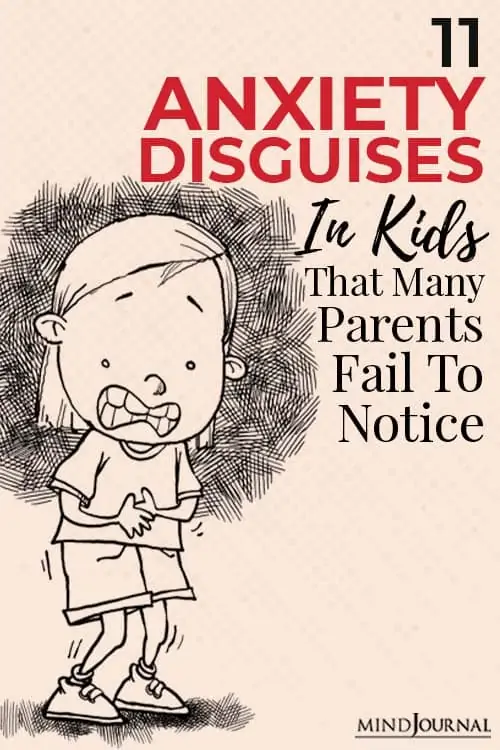
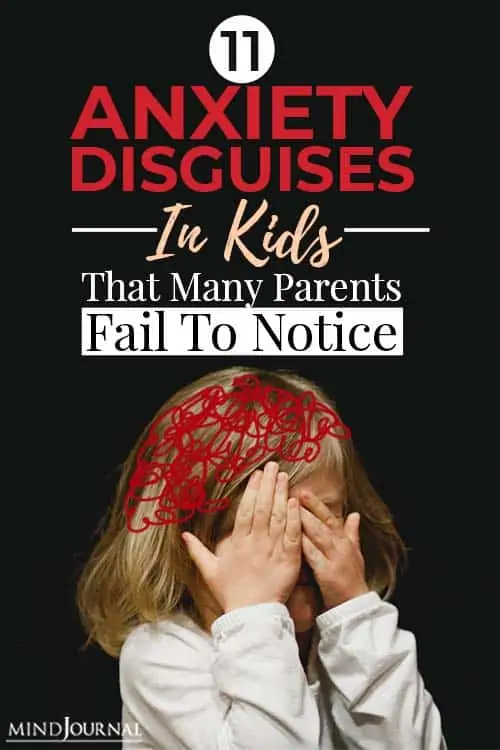
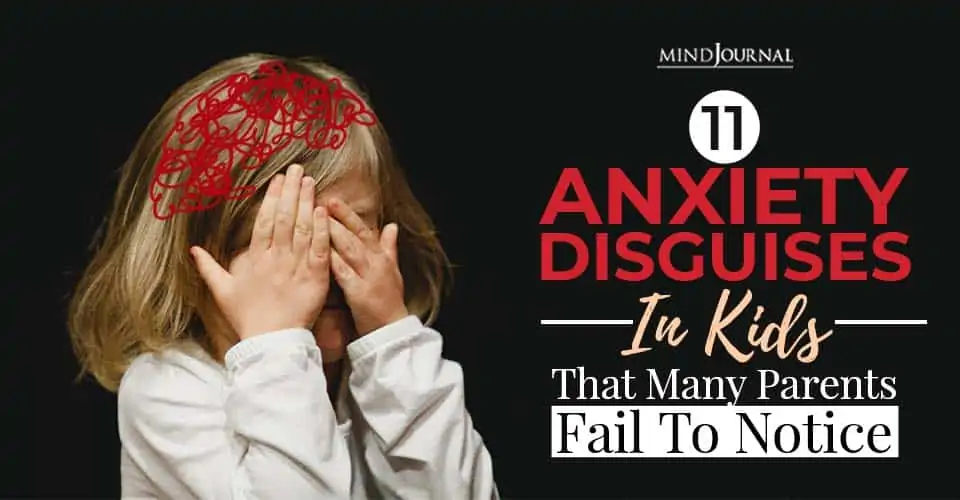







Leave a Reply
You must be logged in to post a comment.